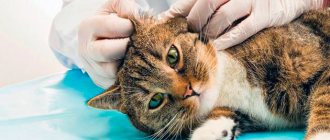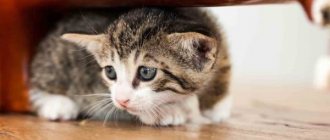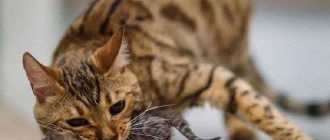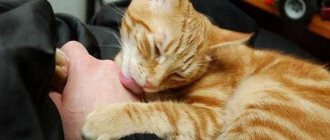From this material you will find out why your cat hisses. Is hissing always a sign of aggression and can cats hiss for no reason? Whether the restless character depends on the breed. And how to calm your pet.
A cat conveys certain information through sounds. At the same time, she uses dozens of sounds that differ in strength, timbre and tone. One of these sounds is hissing. What does your pet want to say when it starts to hiss?
A cat hissing can be caused by many reasons.
Mimicry in the animal world
In nature, living beings often deceive their enemies. Some stand on their hind legs or raise their fur, or spread their wings, as if increasing their size. Some insects disguise themselves as bees, and one type of beetle even buzzes when threatened. Rattlesnakes produce a rattle sound, and almost all of them hiss. Zoologists believe that the hiss of cats is copied from snakes, since everyone is afraid of these reptiles, including the enemies of cats. All these tricks mean “I’m bigger and stronger, it’s better not to interfere.”
© shutterstock
What does a cat hiss mean?
A cat's hiss is a communication signal, just like meowing, growling, or other nonverbal signs (ear pinching or tail twitching). By hissing, the cat is trying to communicate discomfort: this can be both a manifestation of illness and a manifestation of stress. Be that as it may, hissing is an emotional signal that indicates the internal (physical or psychological) distress of the animal.
A cat hissing is a sign of internal discomfort
Causes of aggression
First, you need to clarify the reason for the anger. We will proceed from the assumption that the animal is healthy. A hissing cat is scared and may run away, but it may also start biting and scratching. In the mind of an animal, danger can be the appearance of any unfamiliar and unusual object, another animal, a medical examination, or new smells. Even some unexpected actions on the part of the owner can provoke aggression.
The homeless animal you picked up may have negative life experiences and perceive humans as a source of evil and pain. Only a kind and benevolent attitude will help here. If it is an unfamiliar cat, do not touch, grab or cuddle it. Give her the opportunity to sniff you and get used to the smell. Let him be convinced of the person’s peaceful intentions and it is best to treat her with something tasty.
"Hises like a snake"
Hissing is a very specific sound, eloquently indicating a strong negative reaction. A surge of irritation and negative emotions confirms the entire appearance of the animal:
- open mouth with demonstration of the entire combat set of teeth;
- burning eyes with dilated pupils;
- ears pressed to the head;
- an angry bristling mustache;
- raised wool.
Associated reactions. Depending on the degree of threat and personal temperament, the severity of the defensive reaction is not always the same, so a hissing cat may:
- At the next moment, quickly retreat, fleeing.
- Take a characteristic pose with an arched back and fluffy tail raised up, which means a more serious attitude and an attempt to intimidate the enemy.
- Apply several blows with a clawed paw, while grouping yourself and pressing your stomach to the ground, which symbolizes the intention to fight. The tail twitches nervously or whips from side to side.
Who is guilty. Dissatisfaction, fear and aggression, encrypted in hissing, can be directed both at a specific living object (a rival cat, a dog, a stranger) and “into space”, being initiated by a sudden loud sound or a flashing shadow. Regardless of the source, the cat's expression of displeasure, when further provoked, can develop into an attempt at violent self-defense and end in a harsh aggressive attack.
Unexpected aggressiveness
Your animal has always been calm and affectionate, but now it is unhappy when you pick it up? The reasons why cats hiss when touched for no apparent reason are often due to illness. Sometimes a healthy but inexperienced kitten can “raise its voice” at its owner, then it is better to ignore this attack. Then he will understand that such behavior should be reserved for more dangerous situations.
As a rule, cats have a negative attitude towards the appearance of other animals . The newcomer may encroach on the food or attention of the owner, so the hissing is intended to remind the newcomer of the boundaries. To avoid this problem, never introduce your pet to a new dog right away. Let them get used to each other's smell and the fact of living next to each other, then the cat's curiosity will soon overcome fear.
© shutterstock
Examples of the most aggressive breeds
Below are the most aggressive breeds.
Siamese
Why does a kitten's whiskers break: the main reasons and what to do
Many pet lovers prefer Siamese cats because they are very beautiful in appearance. However, not everyone knows that as pets, they are not the friendliest to others. Siamese cats and cats are known for the fact that they communicate mainly with only one owner in the house, and other family members are jealous of him.
Important! They can literally completely ignore everyone else in the house. They do not like children and are not very affectionate with anyone other than their beloved owner.
Without respect for other people, representatives of the breed easily fall into an aggressive state and can even cause serious wounds.
Siamese cats are one of the aggressive breeds
Savannah
The cat breed has a direct blood connection with the Serval and the Siamese cat. The animal is characterized by energy, mobility, jumping ability, and curiosity.
The habits of a predator are clearly expressed, hence the aggressive behavior towards the owner. Like Siamese cats, Savannah chooses one single owner and treats others with contempt.
Hunting instincts passed on from the serval sometimes require careful control by the owner and education from childhood.
Savannah - a mix of serval and Siamese cat
Abyssinian
Abyssinian cats have a very energetic temperament and natural curiosity. Until old age they remain active and restless. Some compare the animal's character to that of a dog. High mobility is often accompanied by attacks of aggression, especially during the game.
Important! From childhood, the breed lacks a sense of fear and self-preservation, so education is required from an early age. The Abyssinian cat breed is restless from birth.
The Abyssinian cat breed is restless from birth.
Cat attacks are no joke, and cat bites can be more susceptible to infection than dog bites. The reason for this is that the cat's sharp teeth create deep puncture wounds in the area that are sufficient for bacterial activity. What to do when a cat attacks its owners? Although most people find this display of cat character amusing, it is not a good idea to continue this game. It is necessary to make the animal understand that its behavior is not acceptable. For this purpose, cats are sprayed with water and their attempts to continue playing are ignored.
Guests in the house
Sometimes a peaceful domestic cat hisses at a certain person. The guest may smell “wrong,” especially of a dog, or the guest once behaved rudely, and sometimes it is even jealousy. Warn your guests not to touch or try to pet your cat.
Cats usually don’t hiss at their own kittens, but they can react painfully to the appearance of someone else’s kitten. If a cat’s kittens have already grown up, but still try to behave like babies and climb to drink milk, then the cat will drive them away with such sounds - “you’re an adult, take care of yourself.”
Fright
Anything can scare a cat: an unfamiliar environment, a stranger, an incomprehensible smell, a sharp and loud sound. Sometimes fear is associated with unpleasant memories. For example, when visiting a veterinarian, a cat remembered pain and a frightening smell. Finding itself in the same situation after some time and hearing the same aroma, the cat hisses. Try to distract her with something tasty or pet her.
Love and fights
All animals establish the boundaries of their territory using body language, sounds and marks. Before rushing into a fight, cats hiss and growl, indicating that they are ready for battle. Squealing and sounds reminiscent of hissing are an indispensable element of mating games. The cat demonstrates to the cat that she will not give up so easily, and he is obliged to take care of her as expected.
In the world of cats, there is a certain hierarchy, the rules of which must be obeyed. When two animals sort things out, they also hiss at each other. This is how they determine who is “cooler”; the older and stronger animal dominates, and the weaker or younger one must obey.
Unmet cat needs
Human-raised cats may complain when their needs are not met. The hissing begins, no, no, and the owner is in no hurry to fulfill some cat’s desire. For example, a cat in the kitchen is waiting for the bowl to be filled with food, but the head (at home) is in no hurry. Then the plaintive meow turns into a menacing hiss. Is it possible that the kitty curls around the owner’s legs in every possible way, waiting for the owner to stroke it another time, while he is busy with something else? Then the sweet and kind animal turns into an irritated hissing fury.
In similar situations, nothing can be done, because the cat behaves this way due to lack of good upbringing.
Territory defense
If a new person appears in the house, and even more so another animal, the cat will definitely strive to prove its right to the territory. If you get another pet, be prepared to be on guard at first and maybe even break up fights. The cat is sensitive to encroachment on any of its places, its favorite toys and human attention. You need to be patient and give her a little more attention. Pet the cat, show it that you love it, and over time there will be peace in your home.











